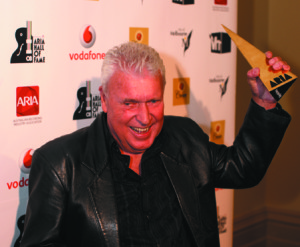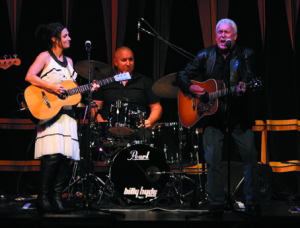ARIA HALL OF FAME-MAX MERRITT
September 10, 2008 | Author: Author: Greg Phillips
Rock, soul and R n’B legend Max Merritt put jet lag aside to chat with Greg Phillips about his Hall of Fame induction. Photo by David Anderson
 “Excuse me, I’m a bit misty eyed”, said New Zealand born music legend Max Merritt softly as he reluctantly pulled his gaze away from the TV screen to introduce himself. Barely three hours had passed since Max had stepped off a plane from Los Angeles to be in Melbourne for his 2008 ARIA Hall of Fame induction. However, it wasn’t so much the flight which had made him emotionally tender. It was what he was watching on screen. Merritt was viewing for the first time the DVD of his benefit gig which was pulled together so quickly and successfully last year by his longtime manager and friend Wal Bishop. The ‘Concert for Max’ was supported overwhelmingly by Australia’s music industry elite in response to news that Merritt was suffering from the life threatening disease Goodpasture’s Syndrome. The show included a who’s who of Australian rock royalty including Ross Wilson, Renee Geyer, Joe Camilleri, James Reyne, Daryl Braithwaite, John Paul Young, Swanee, Russell Morris, Spectrum, Kevin Borich and Vanessa Amorosi to name a few, and raised over $200, 000 to alleviate the burden of Max’s expensive American health care. Max was unable to attend the concert in October due to poor health but now seemed fit and well and looking forward to thanking as many people as possible while he was in town for the Hall of Fame festivities.
“Excuse me, I’m a bit misty eyed”, said New Zealand born music legend Max Merritt softly as he reluctantly pulled his gaze away from the TV screen to introduce himself. Barely three hours had passed since Max had stepped off a plane from Los Angeles to be in Melbourne for his 2008 ARIA Hall of Fame induction. However, it wasn’t so much the flight which had made him emotionally tender. It was what he was watching on screen. Merritt was viewing for the first time the DVD of his benefit gig which was pulled together so quickly and successfully last year by his longtime manager and friend Wal Bishop. The ‘Concert for Max’ was supported overwhelmingly by Australia’s music industry elite in response to news that Merritt was suffering from the life threatening disease Goodpasture’s Syndrome. The show included a who’s who of Australian rock royalty including Ross Wilson, Renee Geyer, Joe Camilleri, James Reyne, Daryl Braithwaite, John Paul Young, Swanee, Russell Morris, Spectrum, Kevin Borich and Vanessa Amorosi to name a few, and raised over $200, 000 to alleviate the burden of Max’s expensive American health care. Max was unable to attend the concert in October due to poor health but now seemed fit and well and looking forward to thanking as many people as possible while he was in town for the Hall of Fame festivities.
Many of the artists on the Concert for Max bill performed tunes which Merritt had made famous during his long career. Although more well known for his 1975 solo hit ‘Slipping Away’, Max and his band The Meteors made their name playing an authentic brand of soul and R n’ B, and were considered one of the finest live acts in Australasia in the 60s and 70s. Merritt’s love of black American music came out of his early days in Christchurch, New Zealand where US Servicemen based there in the late 50s, attended a dance club he was running. Not only would they come for a dance, but they’d also bring the records of Ray Charles, Freddie King and other soul stars of the day. Even more fortuitously they brought their musical instruments.
“Near the end of the month, if they were running out of money, they would begin to sell these instruments,” recalls Merritt. “I still have one of the old Gibsons at home. It is so old that the heads have all perished, just crumbled. I know Clapton has the same guitar. It wasn’t a top of the line model but the serial number probably is in the two or three digits.”
One of the reasons why Merritt is so respected by his peers and indeed part of the reason he has received the ARIA nod, is that the style of black music he played was considered the real deal. Even the usually indifferent UK music magazines such as Melody Maker were full of praise for Max’s raspy soulful voice and his hard working band. Legendary British blues man Alexis Corner thought so highly of them, that he hired them as his backing band for a German tour. Merritt was a musical sponge, soaking up the Rn’B sounds and replicating them as best he could. One of the finest examples of the Meteors great black sound is their 1969 hit ‘Western Union Man’, and in particular the brass section.
“If I had some ideas in mind, I’d tell Bob Bertles, our sax player and he would arrange and voice them,” said Merritt of the recording process. “A lot of the things on the first album were things I wrote on guitar, even the horn lines. What we did (with ‘Western Union Man’), and some of the guys that played on it, hated it too… What we did was that we doubled the horns. The first time everything was in tune. The second time we got the trumpet player to make his mouth piece a little sharp, just a tad sharp. When the two go together, you got that effect. I heard a lot of old blues records in the day and the trumpet was always that little bit bright, especially Chicago blues.”
Like many bands working in Australia in the 70s, The Meteors had that larrikin element about them. They played hard on stage, and even harder after hours. The most colourful character in the band was drummer Stewie Speer, a large man with an even larger grey beard. “Playing with Stewie was like sitting in a big arm chair. He surrounded you, ” said Merritt. ” The rest of the band could fall over, but as long as Stewie was there, and I was there, it was fine… and quite often the band did fall over.” Speer died of a heart attack in 1996 but is still fondly remembered. Max chuckled to himself as he recalled one incident on tour in Victoria. “We were playing down at Lorne one time before we went to England. There was this big stage, must have been 6 or 8 feet high. The roadie had to lift Stewie up there because there were no stairs. It was over Christmas and there was just one person in the hall. We played all night and got sick of it around 11.30pm. We played this tune and said to Stewie, “drum solo” … and then we went home and left him up there! We actually didn’t go home completely, we went outside and looked in through the window and we could see him getting angrier and angrier, and more aggressive with his playing. In the end he threw down his sticks, walked up to the microphone and did a one and a half soft shoe.”
Ironically, after many years of touring and recording with The Meteors, Merritt’s biggest success came as a solo artist, with the self penned single ‘Slipping Away’. Max knew the song wouldn’t suit the band, so he borrowed Stewie’s drum kit, Dave’s bass and he cut it himself at Command Studio in London in ’75. The song was virtually written in a quarter of an hour. “I recorded it on my old Grundig tape recorder. I played the drum bits on a cushion,” recalls Merritt of the original demo. “I kept getting updates on how the song was going in Australia and I couldn’t believe it. I thought they’d forgotten about this bloke, because I’d been away for so long. It was a great time in my life.”
 After the success of ‘Slipping Away’ had died down, in 1977 Merritt relocated to America where he has lived since. He has been involved in producing music for the advertising industry and made the occasional triumphant return to Australia, most notably for the event ‘Long Way To The Top’ playing alongside his mate Billy Thorpe. Then sadly in mid 2007, Max was admitted to an LA hospital where he was diagnosed with the disease which has led to a need for regular dialysis treatment. Consequently manager Wal Bishop rallied the troops back home and did a superb job producing the benefit concert, which was held last year at Melbourne’s Palais Theatre. The DVD is now available and further proceeds go toward helping Max recover. Longtime fans will know Max is no stranger to adversity. He and the Meteors were involved in a serious car accident in 1967 which resulted in him losing an eye. Despite Merritt’s many set backs, he has no complaints. He has toured the world playing music with his mates, met heroes such as Wilson Pickett, Ray Charles and James Brown, is looking forward to making a new record with collaborator Larry Murray, and has now become an official Hall of Famer. If you were looking for the happiest person in the room on Hall of Fame night, you couldn’t go past the grey haired guy sitting next to Kasey Chambers duetting on ‘Slipping Away’. “It’s fabulous. I’m thrilled that I was even thought of,'” Max said of his induction. “It’s quite a privilege and I’m with good company, some mighty artists and I feel really good about it.”
After the success of ‘Slipping Away’ had died down, in 1977 Merritt relocated to America where he has lived since. He has been involved in producing music for the advertising industry and made the occasional triumphant return to Australia, most notably for the event ‘Long Way To The Top’ playing alongside his mate Billy Thorpe. Then sadly in mid 2007, Max was admitted to an LA hospital where he was diagnosed with the disease which has led to a need for regular dialysis treatment. Consequently manager Wal Bishop rallied the troops back home and did a superb job producing the benefit concert, which was held last year at Melbourne’s Palais Theatre. The DVD is now available and further proceeds go toward helping Max recover. Longtime fans will know Max is no stranger to adversity. He and the Meteors were involved in a serious car accident in 1967 which resulted in him losing an eye. Despite Merritt’s many set backs, he has no complaints. He has toured the world playing music with his mates, met heroes such as Wilson Pickett, Ray Charles and James Brown, is looking forward to making a new record with collaborator Larry Murray, and has now become an official Hall of Famer. If you were looking for the happiest person in the room on Hall of Fame night, you couldn’t go past the grey haired guy sitting next to Kasey Chambers duetting on ‘Slipping Away’. “It’s fabulous. I’m thrilled that I was even thought of,'” Max said of his induction. “It’s quite a privilege and I’m with good company, some mighty artists and I feel really good about it.”
www.maxmerritt.com.au


